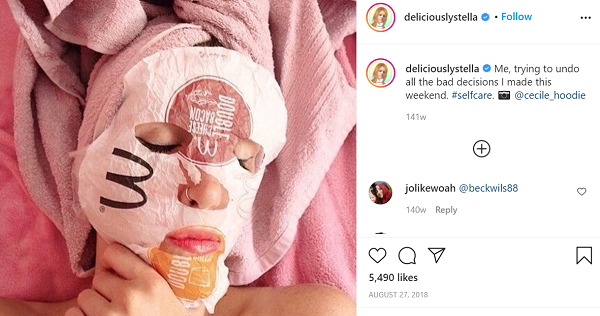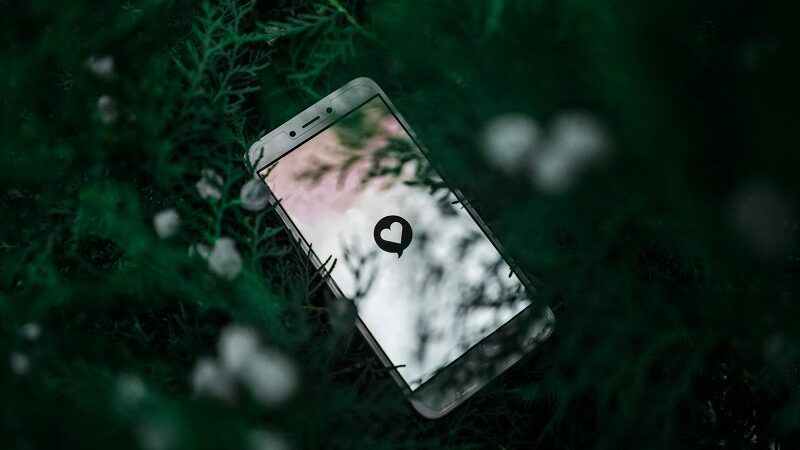British comedian Bella Younger started posting on Instagram for fun, to poke fun at wellness influencers. Then she became addicted to “likes” herself. Her story shows how much Instagram addiction is underestimated.
It all started with an extremely unpredictable photo. British comedian Bella Younger posted a photo of herself on Instagram, in which she sits hungover under a mountain of pizza boxes and smokes a cigarette. Ironically, she also chose wellness hashtags like #eatclean and #readyformonday.
With the pseudonym “Deliciously Stella”, Younger wanted to make fun of wellness influencers on Instagram who, Bella Younger felt, looked outrageously good, were female, rich and thin and provided their community with health tips.
As an aspiring comedian, she therefore thought that it might be funny to make fun of these “wellness gurus” in order to sharpen her own profile in the scene and get off to a successful start as a comedian.
From joke account to influencer
Your idea was surprisingly well received. In particular, her photos, which parodied typical wellness posts and hashtags, earned her a lot of likes and followers.
With photos like this, “Deliciously Stella” poked fun at the wellness influencers. (Photo: Screenshot / Instagram)
–
In the first five weeks it was able to record 1,000 followers and was even mentioned in a print magazine for the first time. Ultimately, her success on Instagram also helped her professionally. She was performing at a comedy festival and an agent started representing her.

McDonalds instead of a beauty mask – that was well received. (Photo: Screenshot / Instagram)
–
But right here the tide slowly began to turn. “Deliciously Stella” was actually just a role for Younger, not herself. But her Instagram personality was exactly what was in demand and what people were hoping for from her appearances.
She slipped into an identity conflict: should she really become Stella in real life and in her appearances? And what if the audience generally liked their alter ego more than they did? At some point, the change happened by itself.
Instagram addiction: Likes determine the mood of the day
The more followers she gathered, the more praise she got for her posts and the more her role as Stella became a lucrative source of income, the more the lines blurred. Bella eventually became Stella.
And then something happened that she had initially made fun of with the wellness influencers: The comments, the number of followers and the likes under her photos became more and more important to her. So important that these metrics determined whether she was doing well or badly on a day.
Mental health problems and job loss
At their weddings, Deliciously Stella had 150,000 followers. This confirmation in the form of likes and the number of followers became more and more an addictive factor. Even a breakdown, job loss, and mental problems didn’t change that.
It wasn’t until the wellness community on Instagram turned away from the eat-clean trend and questioned this ideal itself that Bella began to question her own Instagram presence. In principle, she had now posted the same joke umpteen times and now had no one left to make fun of.
The consequences were quickly felt.
The downward spiral begins
Her engagement numbers dropped, the Instagram algorithm downgraded her, and she eventually lost followers. Bella then decided to retire her Instagram account and put Stella into a virtual coma via a post.
Only: All this changed little about her Instagram addiction, as she did in a very personal report about her experiences Guardian admits.
It wasn’t until she moved to Spain, began therapy and filled her real life with positive people and experiences that the compulsive hunt for confirmation on Instagram subsided. She’s still active on Instagram, albeit as herself and with one big difference.
It doesn’t matter if you’re funny if you’re not having fun. I still want people to like me. I want them to think i’m funny. The difference now, however, is that I know that I am liked without having to have this confirmed by strangers.
The story of Bella Younger shows a special phenomenon of social media addiction that has not yet been scientifically researched: Instagram addiction.
Instagram addiction dangerous for self-esteem
In one of the few studies on this topic published in the specialist journal “Journal of Behavioral Addictions”, The authors write that Instagram differs from other social networks such as Facebook through some special features such as the posting of selfies, the“ Like ”function and the accumulation of followers.
Instagram addiction is less about how much time someone spends on social networks, but more about chasing likes.
Instagram therefore increasingly promotes external social confirmation through these mechanisms, so that at some point, especially for people who do not particularly like themselves, digital confirmation through likes and followers becomes self-confirmation.
To some extent it is of course normal that our self-image and self-esteem also depend on how other people perceive us. But when it comes to Instagram addiction, confirmation from social media metrics becomes the only metric that matters.
Being free is more important than likes
As with a drug addiction, happiness hormones are released with new followers or many likes under a post. You feel liked, approved, important and special. It’s like a high. Accordingly, you fall into a hole when others unfollow your own account or leave negative comments.


